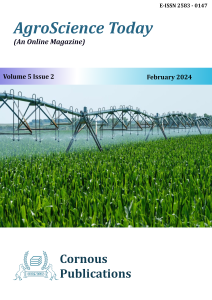Gypsum, when judiciously applied, proves instrumental in enhancing soil structure, mitigating salinity, and improving water infiltration in groundnut fields. The amendment's positive influence extends to nutrient availability, particularly calcium, fostering healthier and more resilient groundnut plants. This, in turn, translates to increased yields and improved nut quality. Additionally, gypsum's ameliorative effects on soil structure contribute to enhanced aeration and root development, optimizing nutrient absorption and water utilization. Overall, the application of gypsum in groundnut cultivation emerges as a promising agricultural practice promoting increased productivity.
Talking about issues facing the food sector doesn't usually bring up the topic of technology. But in the current environment, automation in the food business is essential to the production and distribution of food. The way that food is produced, distributed, and consumed has been completely transformed by the application of AI in the food sector. Artificial Intelligence (AI) technologies, such as computer vision, data analytics, and machine learning, are revolutionizing conventional agriculture methods, streamlining supply chain operations, and raising food safety standards.
Intercropping between coconut palms significantly enhances coconut yield without root competition. This mutually beneficial practice boosts overall profitability. Many horticultural crops of annuals and perennials including fruits, vegetables, spices, plantation crops, medicinal plants, green manure crops and cover crops can be grown as intercrops in coconut plantations. In essence, intercropping optimizes coconut plantation productivity, offering diversified income streams and enhancing overall agricultural sustainability.
Cowpea is an integral pulse crop with multifaceted significance in agricultural, nutritional, and ecological domains. Cowpea stands out for its exceptional nutritional profile, rich in protein, dietary fiber, vitamins, and minerals. It plays a pivotal role in bolstering food security, particularly in regions vulnerable to food shortages and malnutrition.
Gossypium arboreum, commonly known as tree or desi cotton, holds significant importance in the realm of cotton production and agricultural sustainability. This paper provides a concise review of the significance of G. arboreum cotton, highlighting historical relevance, agronomic attributes, economic importance, and potential applications. The review explores the unique traits of G. arboreum cotton, such as its drought tolerance, pest resistance, and fiber quality, which contribute to its adaptability and resilience in diverse environmental conditions.
Technology has contributed significantly to the integration of agricultural practices with improvement and challenges. Innovations led to improvements in productivity and efficiency, with significant improvements in crop cultivation, irrigation, and land use practices. Traditional practices and agricultural scientific knowledge have contributed to sustainable change with the help of modern technology. Farming with modern technology like machinery, post-harvest technology, Internet of Things, irrigation technology, and so on, has benefited the farmers as well as industry. Lot of technology contributed to a significant impact on food security, production, and protection practices of crops. Technological advancements keep on changing the nature of farming practices and moving towards compensating the human population and food demand.
